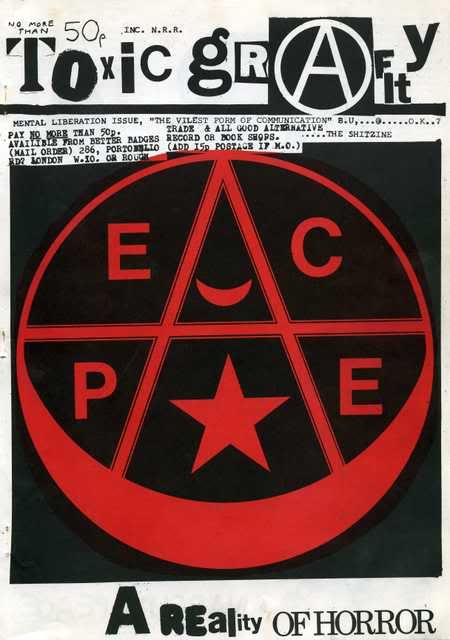
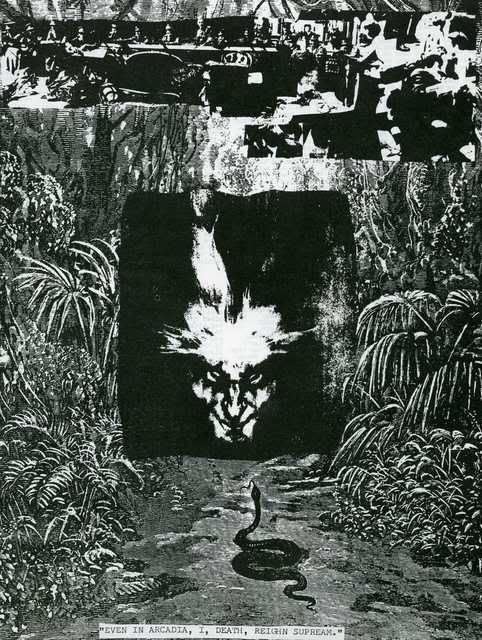
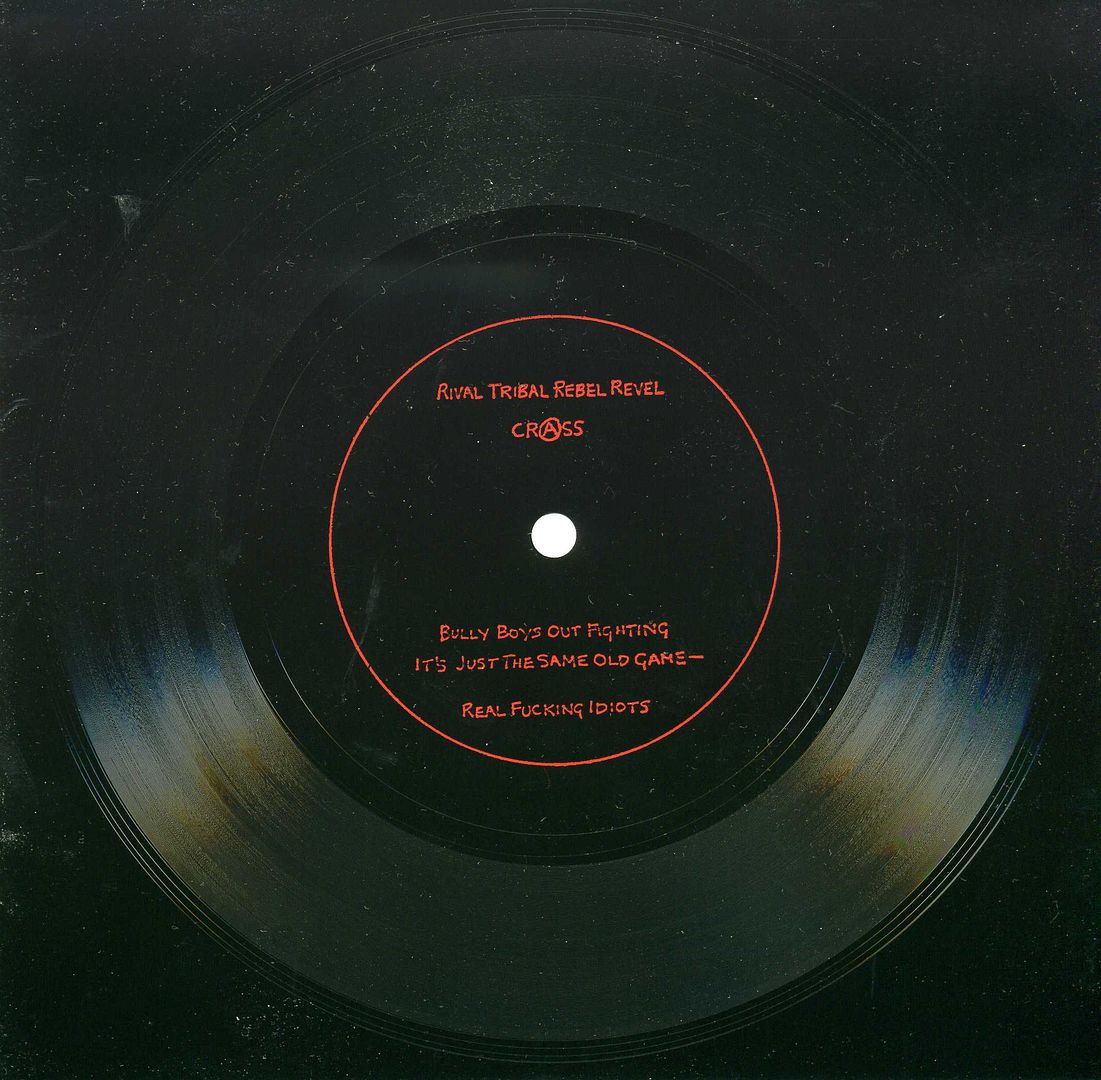
First pressing of flexi
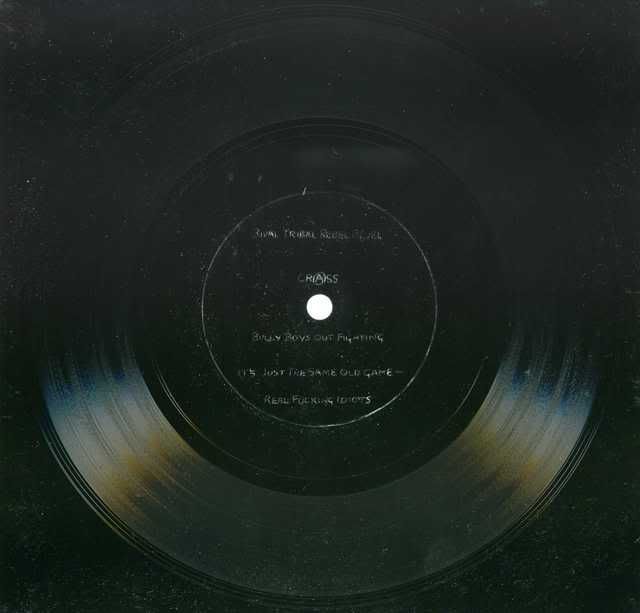
Second pressing of flexi
Crass – ‘Tribal Rival Rebel Revel’ flexi disc
This particular issue of Toxic Grafity is probably the most well known of the handful that were produced. It was also one of the best selling (of all fanzines, not just Toxic Grafity!) due to the free flexi disc of a (then) unreleased track by Crass being included.
It should be noted that Throbbing Gristle are also featured in this issue which was always a bonus for fanzines in the late 1970’s.
I am indebted to Toxic Grafity’s writer and editor, Mike Diboll for supplying the following information below on how this particular issue of Toxic Grafity got produced. All artwork on this post is from this issue of Toxic Grafity.
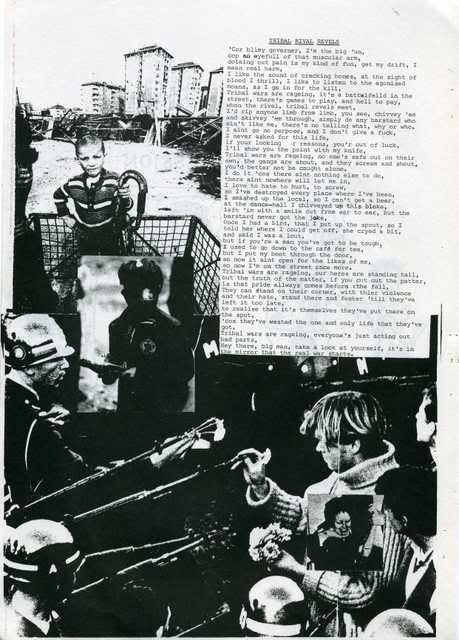
This edition of Toxic Grafity was put together while I was squatting in New Cross, south London and originally printed during late 1979, but it didn’t really get into folks homes until early 1980, when a substantial reprint was done. Originally 2,000 came off the presses, quite how many were eventually printed, I am not sure.
Joly from Better Badges (who also printed the first three KYPP’s fanzines, the last three were printed by Little ‘A’ Printers) used to always swing things so it seemed that I owed him lots of money (quite large sums for those days); I’m sure he may well have been diddling me, but that was my fault, because I was very naive in those days and thought that anything do with business, copyright etc, was bourgeois and reactionary, so perhaps I deserved it. Also, it must also be added that I was off my head a fair bit in those days, but of course so was Joly! Judging by the number of flexi’s that were sent to Better Badges, I suspect the actual print run was over 10,000, perhaps well over.
A year before the release of this particular issue of Toxic Grafity, in 1978, and also during 1979, there had been some really nasty rucks at Crass gigs at the Conway Hall in Red Lion Square in west central London. These rucks had mainly been fought between boneheads and bikers brought in by the SWP.
I can’t remember what the gigs were in aid of, but it was something the SWP had a hand in. The boneheads were used to pushing punks around, but got far more than they bargained for when taking on the bikers, some of whom were grown men in their 30s and 40s armed with bike chains, knives etc. After those experiences at there concerts Crass seemed to get a lot more edgy than they had been previously about sharing any sort of platform with members of the ‘hard’ left wing.
The lyrics to the Crass 7″ single ‘Bloody Revolutions’ is based on that feeling from the band around this time.
Basically it was the left wing causes that Crass would sometimes support, that seemed to aggravate the boneheads, and of course the boneheads would generally mill around the halls looking dangerous, and on occasions causing some real trouble.
Toxic Grafity didn’t really have those left wing associations, and (luckily) I also knew a few of the bonehead contingent quite well. I had always despised their ideology, but on a human level I was quite friendly with some of them. This I think helped diffuse things when Crass performed at the Toxic Grafity event staged at the Conway Hall late on in 1979.
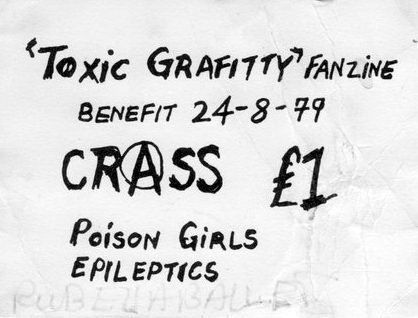
It was not a violent night at all, which was obviously good news at the time considering the previous gigs at the Conway Hall. There were of course some minor problems, but those situations were quickly nipped in the bud by some friends of my family that had come to witness the gig.
The flexi disc followed on from the Toxic Grafity benefit gig, it was Penny’s idea, he bought it up one evening at Dial House, the Crass commune, way out in North Weald, Essex.
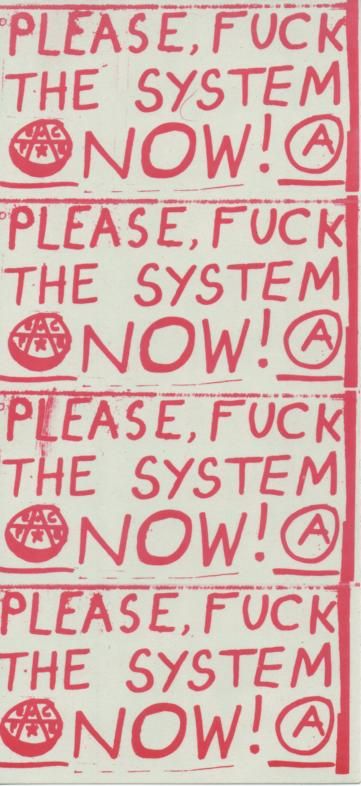
The original Toxic Grafity benefit was staged because of an incident late on in 1978 when I was pulled by the police in Soho, the seedier area of the west end of London. The police stopped me on one of those charges they used to pick punks and other ne’r-do-wells up on, the infamous SUS law. I had stopped off in Soho on my way back from a visit to Dial House, and had the artwork of an earlier Toxic Grafity on me. The police found this highly amusing, as you might imagine, destroyed the artwork, treated me a bit roughly, threatened me, and said that they’d put me on some sort of Special Branch terrorist watch list. Looking back on this as a 50 year-old I can see that this was almost certainly bullshit, but I took it seriously enough at the time!
As a result, Crass decided to help Toxic Grafity out (a previous issue had carried one of the first in-depth interviews with them), and the gig at the Conway Hall and the flexi disc followed on from that.
The track on the flexi disc, was not one of Crass’ more in-depth or enigmatic tracks, rather it was what it says it is, a protest against violent political sectarianism screwing up the young. Of course I was extramely grateful never the less.
I’ve repudiated so much of what I used to believe in during those days in the late 1970’s, but the closing words for Crass’ ‘Bloody Revolutions’ track “but the truth of revolution, brother, is Year Zero” still appeals to the Burkeian in me!
Joly at Better Badges did the litho printing for the fanzine and sorted out the badges. Southern Studios took care of the flexi disc by Crass, but I can’t remember where they had it pressed, or how many exactly were manufactured. The Crass flexi discs were written in red for the original publication of Toxic Grafity, others were written in silver for subsequent issues of the fanzine.
Eventually there were five Toxic Grafity fanzines that were produced and sold from 1978 – 1981.
Toxic Grafity issue 6 and 7 were planned and in large part nearly prepared, but I became a father in March 1982 (I’m now a grandfather, twice), and ‘reality’ stepped in quite soon after so all those projects were cancelled.
The later Toxic Grafity’s, including the issue above, had dropped the whole band interview thing and had became more like an anarcho-punk agit-art magazine, similar to what Kill Your Pet Puppy would evolve into.
By 1983 I was doing a lot of dispatching and also a lot of ‘white van man’ work until sometime in 1989. While doing these small jobs, a friend of mine, Wayne Minor (from Brixton’s 121 Railton Road bookshop) and myself brought out one issue of “The Commonweal” which was a more mainstream anarchist publication in 1985.
In 1989 I entered university as a mature student.
I now live and work in the middle east.
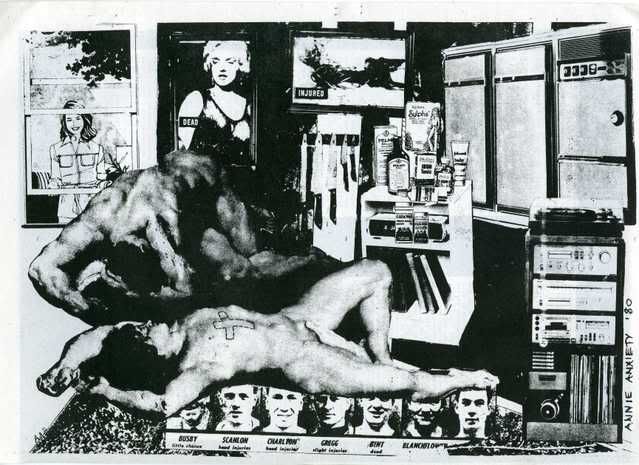
To advertise this issue of Toxic Grafity, Crass arranged to press up a few hundred vinyl copies of the same version of ‘Rival Tribal Rebel Revel’ to give to record stores that were ordering the fanzine in bulk. This was so the shop had a ‘hard’ vinyl copy that the shop could play rather than play the flexi disc from the fanzine if any potential buyers wanted a snippet pre buying the product.
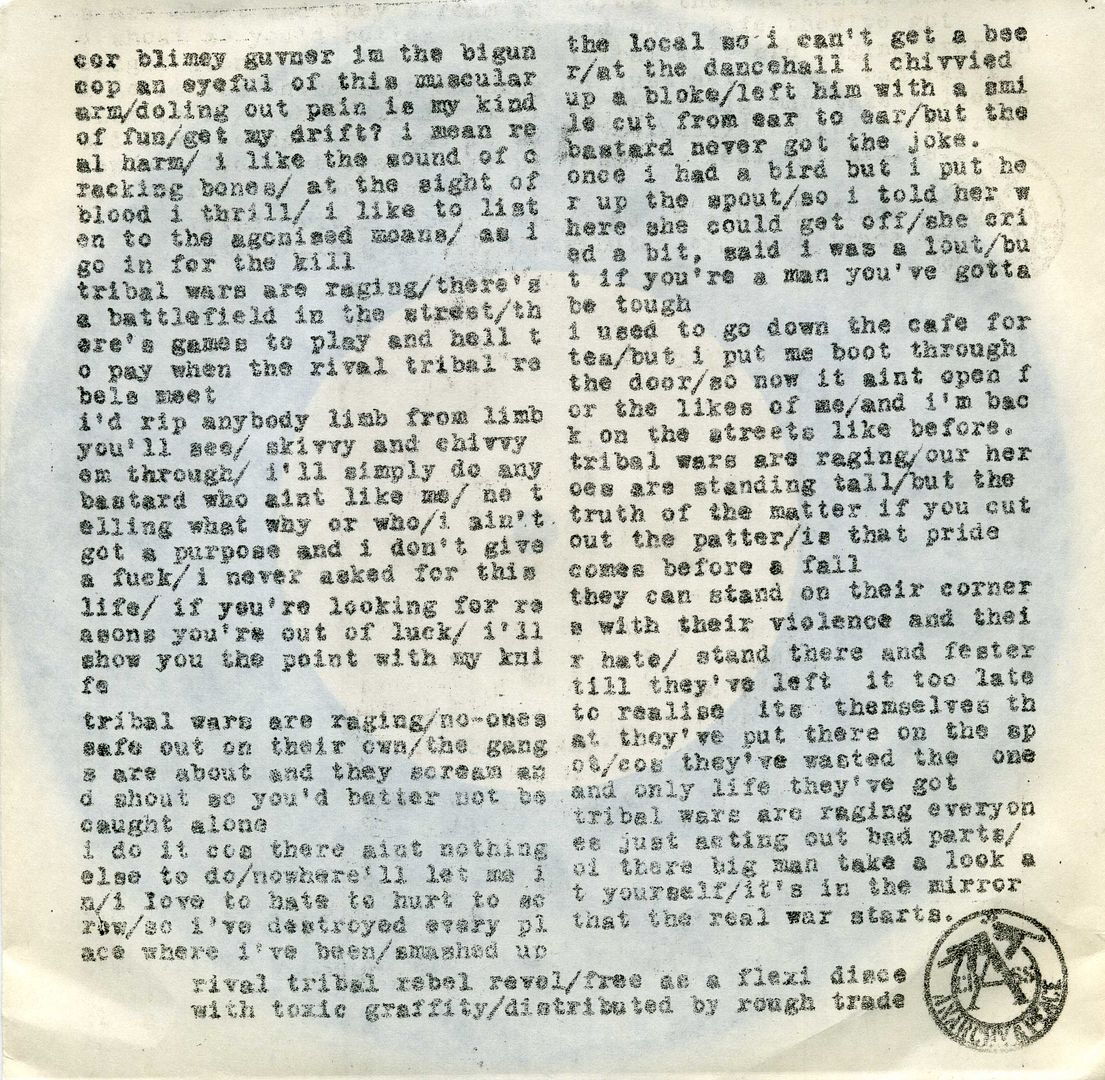
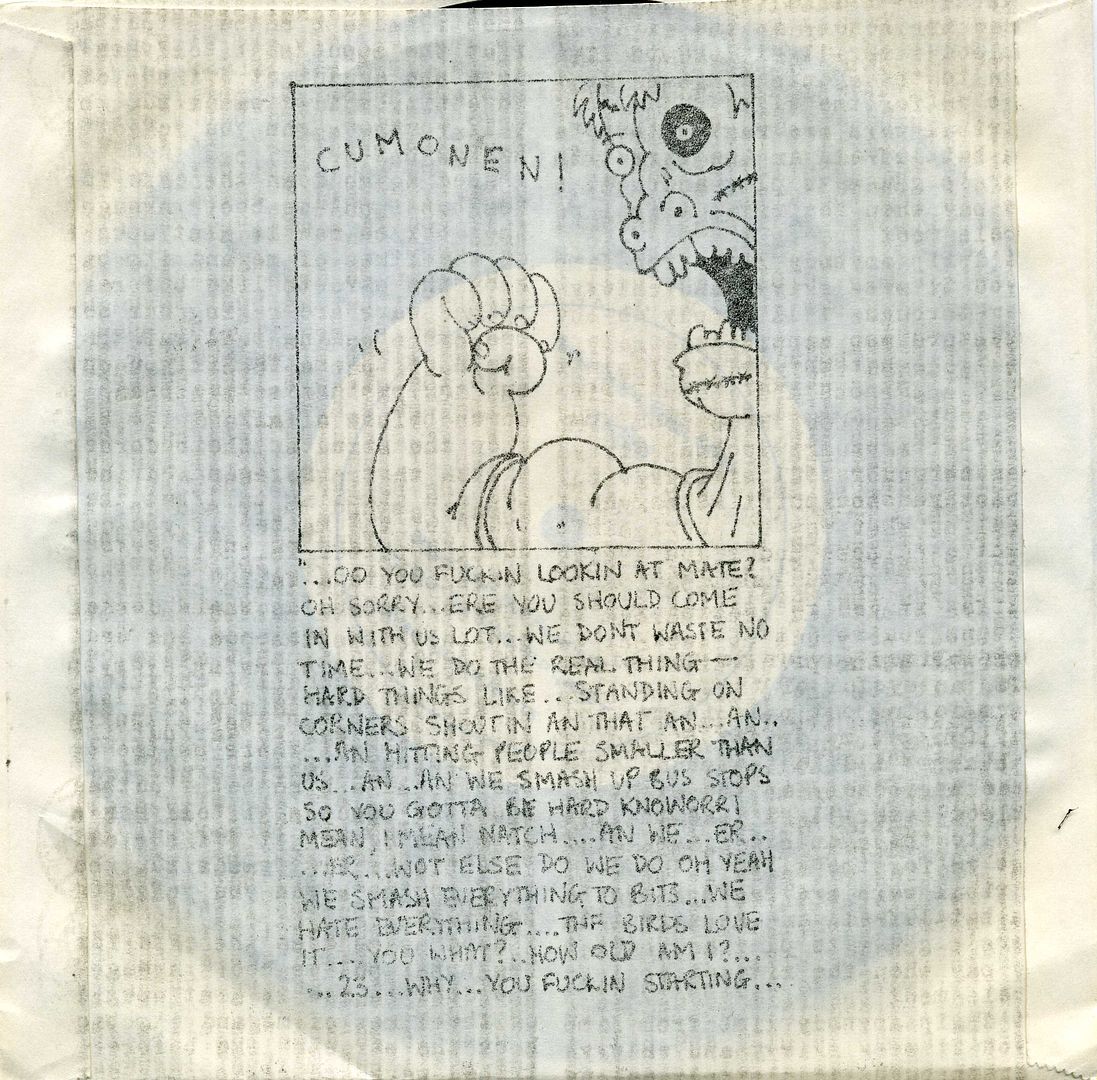
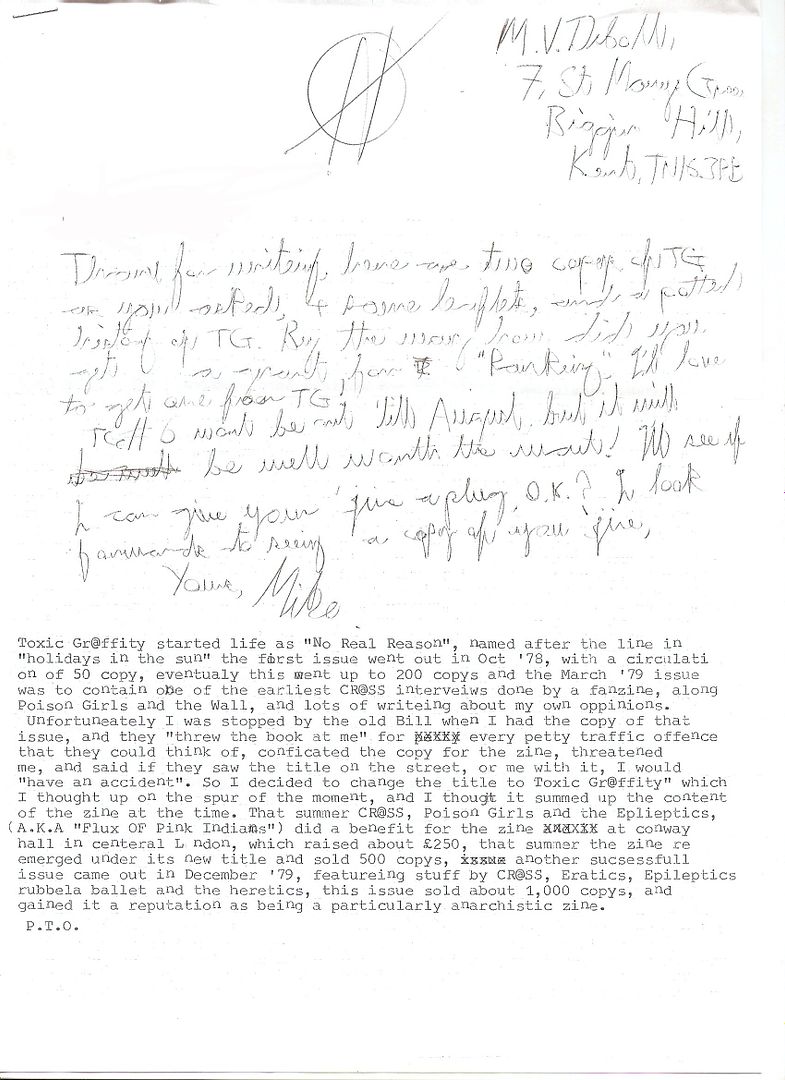
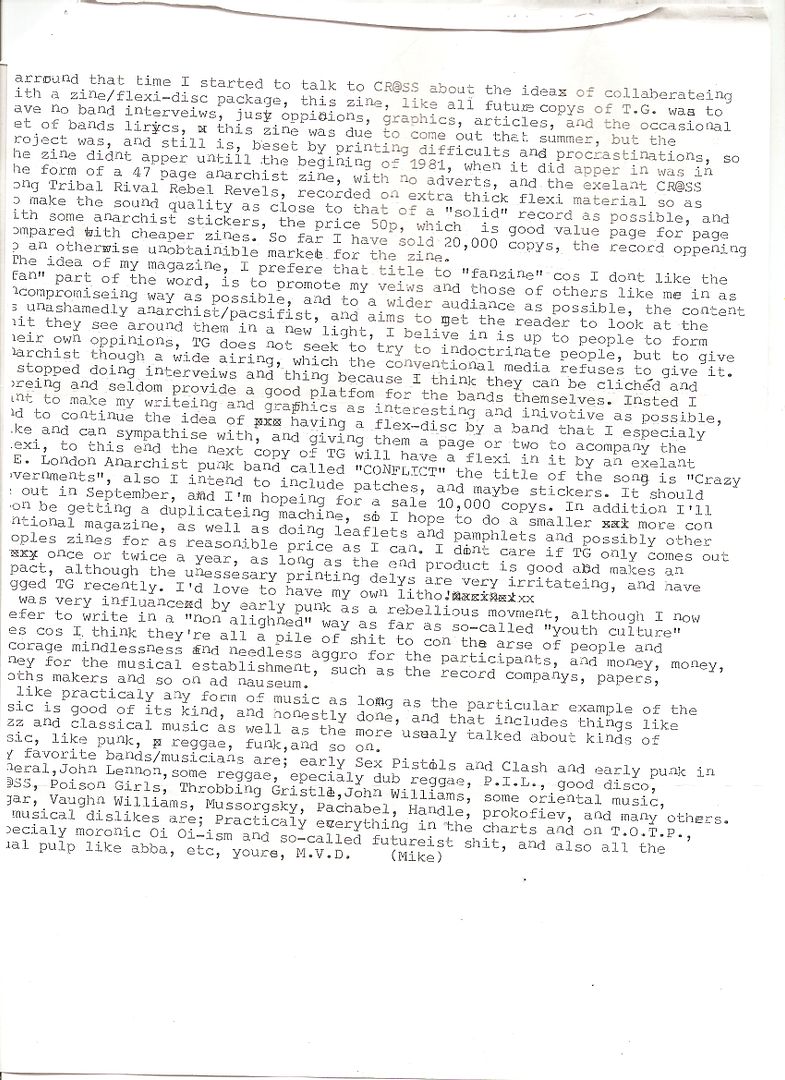
With thanks to Chris Low for supplying the personal letter from Mike to Chris

alistairliv
March 16, 2009 at 9:27 amYes, but what about Mclaren’s previous attempt to hijack the New York Dolls?
From Malcolm Mclaren press release for the New York Dolls February 1975
http://www.thunders.ca/images/gslamf/gslamf10.jpg
WHAT ARE THE POLITICS OF BOREDOM?
BETTER RED THAN DEAD!
Contrary to the vicious lies from the offices of Leber, Krebs and Thau [Dolls former management] the New York Dolls have not disbanded. The New York Dolls…have, in fact, assumed the role of the ‘People’s Information Collective’ in direct association with the Red Guard. This incarnation entitled ‘Red Patent Leather’ will commence on Friday, February 28 at 10 p.m. …This show is in co-ordination with the Dolls’ very special ‘entente cordiale’ with the People’s Republic of China.
Mike Diboll
March 16, 2009 at 11:07 amI don’t think it matters one way or the other whether McClaren et al had a plan or not re the Sex Pistols, the important thing is that the band took on a significance way beyond whatever McClaren, Sex, &ct had imagined or could control. Look how limp and wet fart his subsequent projects were, Bow Wow, Wow, &ct.
I agree completely that NMTB has stood the test of time. For me, the most memorable thing about the Pistols is their SOUND. It’s nothing to write home about technically, but it has a certain controlled (most of the time) energy and sexy swagger, part pub-rock and part what someone (can’t remember who) once described as “Light Metal”.
Sam
March 16, 2009 at 6:54 pmI don’t see that lack of publicity makes a band or movement any more ‘authentic’. Without McLaren we’d all have probably never caught a whiff of what was going on. It was the Pistols who inspired the likes of The Clash, Buzzcocks, Damned and later Joy Division, The Smiths etc…
The Pistols set the tone for all who followed, and many of those (The Ramones for example) who weren’t getting anywhere and who would have remained obscure. The Velvets were also a ‘prepackaged’ band, formed around Warhol’s Factory. This doesn’t deny the fact they were one of the most important and influential bands of the last 50 years. As they had zero publicity they really didn’t make it until 20 years after the fact.
Mike D
March 17, 2009 at 7:59 amWell said, Sam. A leftist mindset had long prevented me from seeing the role of entrepreneurs in the “entertainment” industry as anything other than manipulative, exploitative Svengalis churning out “manufactured” or “prepackaged” bands.
Sure, there are plenty of reasons for thinking this way. In 1970s pre-punk was full of such bands. The 2000s have been even worse, and the manufactured and prepackaged phenomenon has spread out from the music industry to encompass literature (or what passes for it) and other aspects of culture today.
That said, the difficulty with the “bastard Svengali” mindset is that it ignores the role of entrepreneurs as facilitators of talent, people who make things happen, or help make things happen. It was the “radical” rejection of this that helped condemn so many of us to utter obscurity, despite various talents we may have had, or the relatively prominent roles we may have played in the subcultures of the time.
Of course, there are manipulative, exploitative bastards out there, but not everyone is like that. And even if they are, still genuine talent is usually able to transcend the limitations imposed upon them by the McClarens of this world. Being managed or represended by someone with professional experience in marketing or PR doesn’t automatically make one a Juile Burchill, a Danny Baker, or a Jonathan Ross (millionaire sell-out punks all). But rejecting it will condemn one to a purist obscurity.
Some people escape this sort of obscurity posthumously. The poet and artist William Blake is an example, who lived and died in eccentric obscurity, but started to become something big in the arts some seventy years after his death. Nowadays he’s taught alongside Byron, who’s Romanticism made him wealthy and famous in his day. The poet Gerald Manley Hopkins is another case in point, a precursor of poetic Modernism, who died in 1888, but started to make it big in 1919. Ditto the Great Wat poet Wilfred Owen, and the Second World War poet Keith Douglas, both of whom copped a bullet in their mid-twenties, and never saw the poetic fame they would achieve.
Most Classical musicians and Renaissance painters had or desperately sought after wealthy and powerful patrons. Perhaps that makes them part of “bourgeois” culture. But when we look at a Michelangelo do we automatically thing of the Medici, or when we hear Mozart do we automatically think of Salzburg court? When I hear the Pistols McClaren is usually pretty distant in my mind.
I suspect that spending some time in the States helps dispel this particular prejudice. And give me McClaren any day rather than the sort of bureaucratic, state-sponsored official culture that is promoted in Europe, New Labour’s crypto-fascistic Britain, and other autocracies.
The alternative is, I suppose, that subcultures promote themselves. Fine in theory, but it hardly ever works in practice, since few of us have any realistic idea of how to go about it. I suppose for better or worse Crass were an exception, but generally getting somewhere means getting into bed either with business or the state or party. give me business any day.
That said, I’m glad I fell into some sort of well-deserved, self-imposed obscurity following my TG days. If I had achieved any sort of youth cultural fame (which really I craved in my heart, despite the denial), I wouldn’t be the person I am now. And for all his manifold and manifest faults, I greatly prefer him to the crazy mixed up kid.
chris
March 17, 2009 at 7:05 pmIntersting you say: “If I had achieved any sort of youth cultural fame (which really I craved in my heart, despite the denial)”
I think this is a very true, though at the time unspeakable, truth.
I remember an older ex punk/’serious anarchist type’ once saying to me (when I was around 14) “why do you do your magazine?” to which I rehashed the customary cliches about ‘getting a message across’. He replied “No, you do it so you’re somebody and so you can blag free records and get into gigs free and stuff. There’s nothing wrong with that”
Just as I’m sure everyone in a band always harboured dreams of being a pop-star. I know i’d have much rather been in Duran Duran or Japan and led that sort of lifestyle even when I was in the credible anarcho-punk acts I drummed for.
To paraphrase an old yippe adage “Denial is the policeman in your head”
Graham Burnett
March 17, 2009 at 7:59 pmI thought it was a river in Egypt…
Mike D
March 17, 2009 at 9:00 pm“Not just a river in Egypt”; damn it, Graham! I was just about to write that and you stole my line! Living in the Middle East I ought to have a copyright on it, in fact I use it sometimes as a one-liner with my students out here (I lived in Egypt for two years, 1991-2, and speak Arabic in the Egyptian dialect, which students find funny out here). Sam pipped me to the post the other day with “Lord of the Flies”: just goes to show, (not so) great minds use the same cliches!
Chris, you’re so right about the “unspeakable truth”. The old anarcho-punk you spoke to was a sage of sorts.
I certainly wanted fame, or better still infamy. But I would never have admitted it at the time. Even our much vaunted “purity” was nothing more than to have fame/infamy absolutely on our own terms, with no compromises to business, state, or whatever. How egotistic can you get? Our revolution would have been a revolution of selfish, narcissistic psychopaths.
Worse still, we forgot how to have fun. When I was deeply lost in my anarcho phase I still loved the raw energy of the Pistols and early Clash, the wry cleverness of Wire, XTC, and ATV, the honest celebration of normal teenage youth/sex angst in the Jam, the Buzzocks, and later the Undertones, the dark existentialism of Gristle and Joy Division, &ct.
But anarcho-punk me could never admit to it. I had been among the early followers of some of these bands (I’m 50 now), but gradually band by band dropped off the list, eventually even Crass. What was left was a grim, nihilistic existentialism, an “anarchism” that was really nothing more than bottled up anger and angst made political, and eventually booze and hard drugs.
The bands I used to love became illicit pleasures. No longer would I go to their gigs. I’d listen to them in private, with the door of my room in the various squats/housing associations I lived in locked, as if I was engaged in some sort of shameful masturbation. Eventually it boiled down to headphones and solo d-rugs. How sad, such a long way from the joy I felt when I donned blue creepers, a slashed t-shirt, and safety pinned my ear.
Graham Burnett
March 18, 2009 at 12:47 am> “I certainly wanted fame, or better still infamy.”
Can I do “Infamy, infamy, they’ve all got it in for me!” as well???
(copyright Kenneth Williams, ‘Carry on Cleo’)
Graham Burnett
March 18, 2009 at 12:52 amNever had a problem with the pluralism of liking Crass and Joy Division, The Fall, Raincoats, Pop Group, reggae, Clash, Slits, etc, etc…
I used to keep my predilections for Led Zeppelin and Yes a bit quiet though…
I was wearing a ‘Yes’ teeshirt at Dial House last summer, Penny commented on it and said he quite liked them…
Nic
March 18, 2009 at 3:43 amThat’s my experience too, Graham: there was room for everything…
Nic
March 18, 2009 at 3:46 amDid you see the documentary on Rough Trade the other night? Some nice old footage (maybe from an ‘Arena’ or something) including the Door and the Window talking about their EP’s being recorded on a cassette recorder to Scritti Politti and The Raincoats rehearsing…
I’ve still got a credit note from Rough Trade from 1981 for 15 copies of one of the fanzines I made: do you think they would honour it?
🙂
Graham Burnett
March 18, 2009 at 8:00 amI did indeed Nic, great stuff! And the documentary on prog rock a couple of months ago…
Mike Diboll
March 18, 2009 at 8:56 amBut hey, that last post ended on a gloomy note. In 1982 I fathered a daughter (I still can’t recall quite how), and from then on in things gradually, inexorably, got better and better (bar one or two significant setbacks).
There’s a spit ‘n’ sawdust pub in the otherwise respectable Sussex town where my now octogenerian parents now live. When I visit them I visit this pub too sometimes. It hosts some wicked pub rock bands whose greying, balding members are ex-punks in their late 40s and early 50s.
I’m always struck by the quality of the musicianship (a living refutation of the three chord cliche), but more than that by the way the decades vanish and everyone there is 18 or 21 again, and the young crowd, those who are 18 or 21 now, lap up grandad’s music.
I’m transported back thirty odd years to pubs in Deptford and Camden, and I’m dancing to Squeeze and Dexy’s and Madness in the days when a crowd of fifty or a hundred was a good night. How anarchy screwed all that up. But then they do a Pistols or a Clash cover, and its an honour to grab the mic or jam.
To clear my head I’ll walk to the foot of the South Downs the next morning. I’ll pray in a 1,000 old Saxon church. In the graveyard is a 1960s tombstone there to someone who died “A Teacher and a Poet”, what better epitaph can there be than that? Beneath him the bones of his forebares, going beack to before the Norman conquest. In the church there are Anglo-Saxon, Byzantine influenced murals there, uncovered in the 1990s since they were obscured in the Reformation.
Then I’ll climb the Downs, breathless, but sessions in the gym make me healthier than how I was in my 20s. Once up there on a sunny morning the sea shimmers golden before Brighton. Behind me is the Sussex Weald and the North Downs shielding London. Up there the air is clean and pure and cleanses my lungs, the sheer greenness of an English summer almost hurts my nearly Middle Eastern eyes. Amid the baa-ing of sheep I sit and drink English beer (Admans) and eat English cheese and farm bread, and read a psalm in BCP English, Latin or Hebrew for friends who can’t be here with me today.
I walk down the hills into Brighton, and lazy bastard get the train a few stops back. Then I’m with my parents, and my darling wife and twelve year-old son and my daughters of one and twenty-seven year of age, sometimes there are my grandchildren too, then it’s wine and British Indian takeaway, or fish ‘n’ chips, fish straight from the channel, the lottery show and rubbish English telly.
And anecdotes about people who’ve passed: my punk mate who threw up pills, sick and Guinness on their door-step as my Dad and my Mum returned with the Thursday shop; Peter Rachman who’d set my Dad up in business; how skills learned in those days, people he knew, had kept the lid on the skins at the Conway Hall gig; drunken songs from his time in Germany, in the last days of war. Each year is precious, because it can’t last much longer.
A few summer weeks of this and I’m back in the desert and 50C heat, amid the dizzying newness of the postmodern metroploi here; a university professor in Comparative Literature, engaged in a project to reform education in the region that has become my adopted home since 2002.
Such is the lot of an aging punk.
Mike Diboll
March 18, 2009 at 10:02 amI had (indeed still have) a soft spot for the early Hawkwind, cica “In Search of Space”, another shameful pleasure. . . .
Re Graham and Nic’s punk inclusivity, absolutely that’s the way most people were at that time, the healthy ones. I was like it for quite a bit.
What interests me though about my anarcho days is more to do with what I’d call “the psychological trajectory of extremism”, how extremism bred further extremism. Bands and eventually the entire musical aspect all dropped way. As did friends and subcultural contacts.
So there I was, in the middle of a small and ever decreasing group of fanatics, until all that was left was my fanatical self, estranged even from my fellow fanatics, who had also imploded into themselves.
I’m not saying all of the people who were on the punk, and later the anarcho-punk scene were like that. Of course not. But it was my experience, and that of a few others.
This is of more than historical interest, I think. For I’m sure something very similar goes through the heads of Jihadi fanatics just before they blow themselves up. The suicide bomb becomes a door to walk through, from the ante-room of radical isolation in the self, into an eternity of bliss.
What we anarcho fanatics lacked was an ideology to die for. Dark, pseudo-suicidal existentialism wasn’t good enough, because the affection aside really we wanted to live and be notorious. The Jihadis have just such an ideology.
This links back to a bit earlier in these posts, where Alistair was discussing the Rood and Scotish identity. I think Benedict Anderson’s idea about “imagined communities” comes in handy here:
http://en.wikipedia.org/wiki/Benedict_Anderson
For Anderson the communities of nationalism are essentially phenomenon of Modernity, and links with a deep historical past are “imagined”, things from the distant and not-so-distant past, which may or may not have any real link with the community in question come to have an iconic significance in modern nationalism as generators of identity. Often, historical continuity is simply “imagined”.
I think one can apply this model to subcultures, counter-cultures, co-cultures, &ct. Perhaps the attempt to link anarcho-punk into some sort wider “historical consciousness” of anarchism is an example of imagining an anarcho community?
Perhaps the postmodern “imagined community” par excellence is Al Qa’eeda. British Jihadism is almost entirely mimetic, with yer average British jihadist having about as much to do with Bin Laden as the boneheads of our era had with Adolf Hitler.
Links with whatever happens in the wider Islamic world are almost entirely “imagined” in the Andersonian sense, and the ideas spouted by the ideologues of British Jihadism connect only very tangentally with anything that’s being said in the actually existing Muslim world outside of their heads.
The ideology is downloadable from the Internet fully formed, as are recipies for easy to mak explosives like “Mother of Satan”. Some Asian lads might have tribal or family connections with places like Waziristan, and from there they get to drift into the Taleban. But that doesn’t make AQ a global conspiracy for world domination personally organsied Dr. Evil style by OBL from a cave somewhere in the ‘Stans of Central Asia.
In my view, mimetic British Jihadism has more in common with school shootings up, teen suicide cults, nihilistic gang violence than it does with real world struggles in Palestine or elsewhere. Perhaps the “Real IRA” are the same? Until that’s understood it can never be effectively dealt with.
My personal insights into the psychology of fanaticism, and my observations of others who were like-minded, have a relevance here, perhaps.
baron von zubb
March 18, 2009 at 1:32 pmInteresting thread.
Makes me feel a bit ignorant. Gaps in my historical knowledge become apparent.
Would I have rather been in Duran Duran?
No,if I’d wanted to be in any band at all I would have carried on.
The whole idea of ‘singing’ about ‘revolution’ became rather quaint.
Maybe im still being self deceitful? Or maybe i’ve not moved on?
But I just didnt feel that imprisoned by revolutionary ideas as others seem to have felt.
As has been previously mentioned, some of the situ stuff for example is still brilliant. Good stuff for the facebook age.
After I went to India for the first time I realised that the idea of world revolution was nieve; that the world was bigger that the UK and that different places had different problems and therefore solutions.
But the core principles of anarcho/whatever ideas are still relevent, no?. Societies DO have self serving elites that are in control.
With the individual feels that is important enough to act upon is another question.
Or
possibly liberation is seen as an individual process.
Or
its just dull?
Mike were you muslim at one point then?
Must have been an interesting mindset.
Are you a person who feels more comfortable within a belief system?
Maybe we all are to a certain extent , if we really look at our state of mind ?
I remember your mum, I think.
Was she into star signs and stuff? The first adult that I met who was.
She said – or whoever I remember having said it – much to my consternation, all anarchod up as I was, that I was ‘a very spiritual person’.
Not what I wanted to hear at the time.
And i’ve no way of knowing if she was right or not..
Unsurprisingly I’m with Sam on The Pistols.
People forget that despite McClaren they were (apparently) in 1976 a brilliant live band (Tony Puppy can verify that perhaps?)
Thats what spurred on all the rest.
McClaren only did a bit of media manipulation.
And he still is by presenting himself as some sort of rock n roll fagin.
UK jihadism?
Thats what working class boys do in Britain. They get all violent. If your in the islamic community you’re gonna do it that way. If your white its Millwall.
If you think your smart its the A B’s.
Having said that, there has been and still are some really fuckin nasty Islamo fascist clerics about, who have agendas that they foster upon the gullable.
And of course the fact that most of the muslim world is ‘undemocratic’ treats its citizens badly but at the same time the ruling elites are seen to be pals with The US.
The struggles of the Waristanis or the Pashtuns in Swat are only now in the spotlight because of the potential threat to the west.
But these and many others have been struggling againt there own corrupt- both morally & actually – governments for a while. The anti government movemnents in Egypt & Algeria spring to mind.
Mike D
March 19, 2009 at 9:30 amHi Zubb:
“Would I have rather been in Duran Duran? No,if I’d wanted to be in any band at all I would have carried on.”
Me neither, esp. not Duran Duran! I’d arsed about in bands, but it was the writing and visual arts side of things that really interested me. That and the sort of “life as on-going performance art” thing that characterised the early days of 66a.
“But I just didnt feel that imprisoned by revolutionary ideas as others seem to have felt.”
In my case (and I can only really speak for myself) it wasn’t so much a case as feeling “imprisoned” by revolutionary ideas as an inexorable slide into fanaticism and eventually a kind of nihilistic solipsism. I agree with you that if there is any life left in any of the -isms and -ologies we were into it’s Situationism, their critique of consumer capitalism not only still applies, but seems positively prophetic.
“After I went to India for the first time I realised that the idea of world revolution was nieve; that the world was bigger that the UK and that different places had different problems and therefore solutions.”
Absolutely, I can well see how time in India would have that effect on a reflective mind. Living in the actually existing Muslim world (early 1990s) relieved me of the naieve Islamist ideas I had in my head at that time (although it didn’t have that effect on every convert); the States rid me of the inane knee-jerk anti-Americanism that is a common affection of the British and the Euro left.
Sure, societies do have self-serving elites (an AIG bonus, anyone?), but is anarcho- this and that any real way to deal with it? and yes, maybe Liberation is an individual process, but it is an individual process with wider social and cultural ramifications. I find many parallels between my life and St. Augustine’s “Confessions”, although not for a moment would I claim to have as a great a mind as he.
“Must have been an interesting mindset.”
There’s much I could say (some of it I tried to say in my book), but living out here I have to be careful of what I say, and how and where I say it!
“Are you a person who feels more comfortable within a belief system?”
A very interesting question. I suppose the short answer is “yes”. But then don’t we all need that, one way or another? What is Anarchism, or anarcho-punk but a belief system of sorts? Only those who are extreme individualists to the point of psychopathology can do without belief systems at all, and the innocent suffer the consequences.
In terms of religion, again I’d answer “yes”. To me real religion has to be, shock, horror, “organised religion”. But being “organised” doesn’t mean that there isn’t scope for dissent and different views, just look at the range of views in the C of E today!
Religion has to be organised for the simple reason that being truly religious (in my book) involves some sort of submission to something greater than one’s self. This is God, primarily, but also the recieved tradition and historical consciousness of those who have done more and know more than me.
I have a great respect for people like the Quakers, the Unitarians, and the Universalists, particularly their achievements towards peaceful and humanitarian goals. But for me there is still to much “make it up as you go along” about their approach to religion.
The American Transcendentalists got it even more wrong still, ditto certain strains in “spiritual” Romanticism. The individual ego has to be conquered before spiritual progress can be made, as we find in the teachings of Christ and the Buddha and the idea of “jihaad an-nafs” in Sufic Islam. The solipsistic know-all approach found in Emerson and Thoreau is wrong, I feel.
On an artistic level I think Eliot’s “Tradition and the Individual Talent” should be required reading for all those masses of “artists” and “poets” who are still hung up on Romantic individualism (as I was, in a way, in my TG days).
“I remember your mum, I think.
Was she into star signs and stuff? The first adult that I met who was.
She said – or whoever I remember having said it – much to my consternation, all anarchod up as I was, that I was ‘a very spiritual person’.
Not what I wanted to hear at the time.”
I’m amazed you can remember my Mum! Unfortuantely, she can’t remember you as she’s quite sick with Alzhiemers these days. Yes, she was heavily into astrology and stuff, and the tarot, and crystals, and “white magic” and stuff. All this had been big influence on me in my early to mid teens. My Dad, a Protestant agnostic, tried to counteract these unhealthy interests by getting me into motorbikes and stuff. I’m still a bit of a petrolhead. My Mum had been bought up in a convent, part of her side of the family having been converts to Catholicism from Judaism. She rejected all this for all the New Agey, “spirituality lite” stuff, I in turn rejected that, so I guess what goes around comes around.
“Thats what working class boys do in Britain. They get all violent. If your in the islamic community you’re gonna do it that way. If your white its Millwall.”
For quite a while I lived around the corner from Millwall, and know the scene there, or really the one that used to exist there. That’s why I in my novel I juxtapose the bonehead skins with my Jihadists, and have pass-for-white Djamal convert from neo-Nazism to Jihadism.
“Having said that, there has been and still are some really fuckin nasty Islamo fascist clerics about, who have agendas that they foster upon the gullable.”
Absolutely, but in the actually existing Muslim world, say in Egypt or Algeria, they exist at the extreme end of a continuum of voices, so they are constantly viewed with in a wider context of ideas. Only with mimetic British Jihadism is this very narrow spectrum of ideas seized upon as if it is some sort of answer to everything. Much as we used to do with our -isms and -ologies, ditto the BM boneheads. As I’ve gotten older one of the things that has struck me is the extent to which ideas that I once imagined to be “the answer to everything” in fact are little fragments, often not particularly distinguished fragments, of a wider history of ideas.
“The struggles of the Waristanis or the Pashtuns in Swat are only now in the spotlight because of the potential threat to the west.”
When I lived in Al Ain in the UAE the language of the streets was either Urdu or a mix of Urdu and Arabic. I had a Pashtun driver and handyman who became a very good friend. I don’t bendy the word “friend” about lightly, but he is one of the few true friends I’ve ever had.
This came about when he had a heart attack. Sub-continentals of all sorts are treated like scum in the Gulf, where they constitute an imported working class, and he was left alone in a government hospital. We visited him there and made sure he was alright and well looked after before his fellow clan members could come from neighbouring emirates to look after him. We thought this was just common decency, but to Jan and his clan it meant far more than that.
His various brothers and cousins who eventually turned up were a fearsome looking lot, beturbaned, with leathery dark brown skin, heavy aryan features, and piercing green eyes.
Under “Pashtunwalla”, the honour code of the Pathan we have become honourary clan members, utterly irrespective of our nationality or religion. our welfare to be guarded with their lives.
I got many invites to Pashtunistan (like Kurdistan a country that doesn’t exist, but if it did the world would be a more peaceful place), to sample such delights as shooting AKs and smoking “chirs”, raw Afghani opium. We used to communicate in a mix of English and Arabic and Urdu, I was “Pagalwalla”, from “Pagalistan”, the land of the crazy people. Coming from a Waziristani that’s rich.
If I were single, I probably would have gone, but with a family it wouldn’t have been responsible to take the risk. Jan used to brush my fears aside, “You our guest, we have kalashnikow, we make kill Talib log if they try make kidnap”, Holiday in Cambodia, Belsen Was a Gas, tell me about it!
slyme68
March 21, 2009 at 2:43 pmonly an ideologist can refer to “situationism”. is religion the opiate of the people or are opiates the religion of the people, and can old punks tell the difference?
opportunists of the world unite, you have no-thing to lose
Mike Diboll
March 21, 2009 at 5:03 pm“Situationism” was as much an aesthetic and artistic movement as it was a political one, or at least it’s lasting effects has tended to be in art rather than politics. So is one then an “ideologist” if one speaks of Impressionism or Constructivism?
For the record, the reason while I think that of all the -isms and -ologies I was into “Situationism” still perhaps has milage in it is that Debord’s idea of the “spectacular” nature of advanced capitalism clearly retains explanatory power in the face of modern consumer capitalism, perhaps more so than terms like “postmodern”.
I know Debord wasn’t the only situationist, and that the term was/is disputed by, eh hem, situationists themselves. Still, it remains a term that can be used meaningfully without becoming an “ideologist”!
Perhaps one needs to have taken opiates (as Marx would have done with Laudanem, opium dissovled in brandy, a mid-C19th cure all) to understand quite what he meant i saying “religion is the opium of the people”: its not just the invention swindling priests and rulers, but part of suffering humanities yearning for sucour and consolation, thus religion is also “the sigh of the oppressed creature”.
In Feuerbach God is “a tear of love, shed in deepest concealment, over human misery.” Are we really so distant here from the God of Christianity, who is here with us in our suffering and who suffers with us? Are Marx and Feuerbach really so different from the formulation of the Reformation mystic Sabastian Franck, “God is an unutterable sigh, lying in the depths of the heart.”
The problem with Marx came in his view (as “ideological”, in the sense of false consciousness, as any body else’) that the abolition of “religious alientation” would come about once the social coditions that had produced this alientation had been abolished by the revolutionary prolateriat. In the unalinetated conditions that then would prevail, man would no longer be divided within himself, alienated from his fellow man, and the project of history would reach its fulfilment in “perfectly intelligable and reaonable relations between man and man, and nature”.
Marx’s outlined his utopia somewhere in the German Ideology, something about hunting in the morning, fishing at noon, rearing cattle in the evening (?) and doing lit. crit. after dinner. Didn’t quite work out like that, did it? And after piles of corpses God knows how high it is Marxism and its kin that have died out, and religion that has found a new life.
So stick that in your pipe and smoke it!
alistairliv
March 21, 2009 at 11:57 pmPossibly slyme68 was referring to this (on here at
https://www.killyourpetpuppy.co.uk/news/?p=402 )
Situationist: having to do with the theory or practical activity of constructing situations. One who engages in the construction of situations. A member of the Situationist International.
Situationism: a meaningless term improperly derived from the above. There is no such thing as situationism, which would mean a doctrine of interpretation of existing facts. The notion of situationism is obviously devised by anti-situationists.
From The Boy Scout’s Guide to the Situationist International:
The Effect The S.I. Had On Paris ‘68 And All That, Through The Angry Brigade And King Mob To The Sex Pistols by Tom Vague
Mike Diboll
March 22, 2009 at 8:57 amRe:
“Possibly slyme68 was referring to this (on here at
https://www.killyourpetpuppy.co.uk/news/?p=402 )”
Quite possibly. The problem is that the “-ist = good, -ism = bad” approach is that while it might serve as some sort of secret handshake for those in the know (“Situationism”, eh? Obviously not one of us), it flys in the face of standard English usage.
I suppose the objection is that abstracting the activities of the -ists into an -ism fossilies the action and creates an ideology out of it.
Perhaps there is a risk of that, but I think that risk is outweighed by the risks attached to using “in” jargon that only insiders understand.
If something (an activity, an idea) is worth discussing, it worth discussing in language that anyone can follow. The ghettoisation of language is something that used to trap me intellectually during my “fanatic” days.
Today we think there is such a thing as “Romanticism”, thus Blake, Byron, Shelley, Wordsworth et al all get lumped together as “Romantic Poets.” But this term would have been meaningless at the time, and the poets we now group together as part of that school would have had little or no sense of working together on a shared project. Thus Blake dismissed Wordswoth as a “pagan philosopher”, and Byron though Blake was a crackpot. The term “Romanticism” was applied retrospectively, and really it only makes sense after the event.
One could say much the same about any other literary, artistic or aesthetic movement that has an -ism attached to it. But does that -ism create or indicate an ideology? Perhps it does, but I think that’s reading far to much into it.
Even with political movements I think that saying an -ism is an ideology is going too far, since an ideology requires more substance than a mere suffix can provide.
Take anarchism for example. It can be applied to such a diversity of ideas as to render the term almost meaningless: radical individualism, ultra-libertarian freemarket economics, factories run by workers’ councils, violent revolution to overthrow the state, peaceful resistance to all authority, government without parties, anti-civilization “primitivism”, syndicalism, left-wing socialism, &ct., &ct., &ct.
Nevertheless, we think the term is meaningful because we can abstract from this diverse and sometimes conflicting group of ideas and practices certain commonalities, for instance anti-statism, that can be defined as anarchism, which is practiced by people called anarchists. Nevertheless, the -ism that we derive from “anarchy” and “anarchist” seems to be to be far too vauge to be called an “ideology”.
I think the same applies to “situationism”. Perhaps situationsits might object to the -ism derived from their practices in that it suggests a body of ideas and actions that have become fixed and immutable, an ideology in short. But as I’ve said, I think thats going too far. There is/was sufficient diversity (and sometimes conflict) between situationists to prevent a mere suffix from fossilising their ideas and actions into an ideology.
For me it’s just a fairly vague term (unlike the SI, which is specific) that describes a set of ideas and actions from within a given historical context that share sufficient commonality to warrant an -ism, just as I use the term “Romanticism” as a kind of linguistic shorthand when in fact I know it is retrospective, and covers a host of differences, conflicts, &ct.
Graham Burnett
March 23, 2009 at 2:15 amIs it true that when once asked ‘what is situationism’ at a press conference, Debord replied “I’m not here to answer cuntish questions” and stormed out of the room?? Maybe I should try that approach the next time I’m asked to define ‘permaculture’ and see where it gets me!!
alistairliv
March 23, 2009 at 7:55 am“The Situationists, whose judges you perhaps imagine yourselves to be, will one day judge you. We are waiting for you at the turning.” On this vaguely threatening note Maurice Wyckaert, speaking for the Situationist International, wrapped up a rant at London’s Institute for Contemporary Arts in 1961. One baffled member of the audience (or was he a plant?) asked just what was “Situationism” all about? Guy Debord arose to announce, in French, “We’re not here to answer cuntish questions,” whereupon the Situationists walked out.
In a publicity brochure issued several years ago, the ICA recalled the event as “a conference whose chairman was stone deaf, whose main speaker spoke no English, and whose participants denied that the meeting existed.” (Actually they only denied that its topic existed, since the Situationists defined “Situationism” as a nonsense word coined by anti-Situationists.) The ICA, as we shall see, has taken its revenge.
From The Realization and Supression of Situationism
by Bob Black… article continues at
http://library.nothingness.org/articles/SI/en/display/242
Although the Situationists boasted that theirs “was the best effort so far toward getting out of the twentieth century,” they never made it over the wall. Their old foil the London ICA, among others, several years ago returned them to their cells in the world they’d made their break from.
Their art made the rounds at three prestigious avant hip venues. In 1989-1990, “On the Passage of a Few People Through a Rather Brief Moment in Time” – named after a Guy Debord film he will no longer permit to be shown – went from the Musee national d’art moderne (Centre Georges Pompidou) in Paris to the London ICA and on to the Boston ICA where I took it in. As delicately phrased by the catalog, the exhibit posed “a unique museological challenge,” much as the remains of a downed UFO pilot would present a funeral home with a unique mortuary challenge.
Mike Diboll
March 23, 2009 at 12:50 pmWell, like it or not we’re all out of the C20th now. The “Situationism is a nonsense word” position was, I think, articulated in 1958, in the middle of said last century.
Since then so much has changed, not least of all in Situation-ism. Surely the passage if time allows us the -ism without being accused of being “an ideologist” (can “ideology” in the bstract accept an -ist?).
Here’s to a less pedantic tone on this thread!
alistairliv
March 23, 2009 at 2:53 pmAh, but have we really left the 20th century? Historians (or to be terminally pedantic, some historians) talk about ‘long centuries’ for example:
the long seventeenth century runs from 1580 to 1715 – approximately.
The long nineteenth century runs from 1789 to 1918.
And not to be out done, the long eighteenth century stretches from 1688 to 1815 (or even 1832).
There is also a short twentieth century – 1914 to 1991.
If the current global economic crisis turns out to be really bad, and you throw in peak oil and global climate change, either the twentieth century will have to be extended to be 1918 – 2012 ish
OR we have just lived through a very very short 21st century 1991 – 2009 and are about to enter a very very long 22nd century equivalent to a new Dark Age/ fall of western Roman Empire.
baron von zubb
March 23, 2009 at 5:03 pmNo time to carry on but a bloody good thread this is.
Mike, how weird; like you I’ve been called ‘pagalwallah’ many a time, probably because by the time i got into Baluchistan i was classed as ‘pagal’ for doing the overland route at all, did it 3 times, shot AK’s and got invited to afghanistan by ‘chota dosti’ i’ve met.(I never went, it was the talib time). Even stayed in the refugee camp outside peshawar for a night or two. That was a blast.
(I was known as ‘karakoram Jake’ for a bit ‘cos, posuer that i am, i dressed like a pathan for a decade. Still have the hats!!)
Pashtuns are bloody good folk in many ways, its the most ‘different’ place ive been to. But their social system is not of this era. I make no judgement on that.
I hope they boot us out of their country but get the program of not letting their mates launch planes at us.
Im not an honourary brother but certainly had some good times with those wild men. Interestingly when in Swat it quickly became clear that they really hated the punjabi pakistans, rather than us infidels. And thats got a lot to do with whats going on now.
Nice to talk with someone who knows that part of the world. I’ve probably met 5 people -tops- in my life whove been to N W F P.
When there i even got to the point of asking people if they were ‘ben-i isreal’
And that didnt always get a foul look. Some said yes. Blew me away.
Its a very interesting part of secret hebrew/afghan history, the theory being that the Pashtu are one of the lost tribes. He he. Bloody yids, get everywhere…
Gotta rush
BVZ
Graham Burnett
March 23, 2009 at 11:42 pm“the long seventeenth century runs from 1580 to 1715 – approximately.
The long nineteenth century runs from 1789 to 1918.
And not to be out done, the long eighteenth century stretches from 1688 to 1815 (or even 1832).
There is also a short twentieth century – 1914 to 1991.”
I’m confused. How does that work then???
Mike Diboll
March 24, 2009 at 11:33 amA good point you made about the “long” and “short” centuries, Alistair. The point is of course that chronological centuries don’t necessarily equate to people’s perceived historical significance of what happens in a “century”.
“The Long Eighteenth Century” is well established. I have taught it out here in Bahrain as 1660-1982.
The original idea was that students got the Restoration, the Englightenment and Romanticism as the “long” century.
Out here in the Gulf the English Restoration means diddly-squat, where as religious fundamentalism is a pressing contemporary reality. Thus I take it from the end of the Puritan Commonwealth, look at the Restoration in terms of how it was instrumental in making Enlightenment thought minstream in England, then go on to rationalsim, the Augustan age, the American and French revolutions, a bit of Romanticism, and how certain Enlightenment ideas continue in the form of Utilitarianism.
1832 is an arbitary cut off point, there’s the first Reform Act, the rise of Chartism, the death of Shelly, &ct.; Byron, the last of the great Romantics dies in 1836, then Victoria comes to the throne in 1837. What follows, high Empire, the factories, organised labour, the railways, municipal government, health and education reforms, the rbeginnings of electricity, and other technological developments seem more “Victorian/C19th”, and I agree, this “belated” C19th continues until 1914. I also like the “short C20th”, 1914-1991!
Mike Diboll
March 24, 2009 at 12:02 pmbahoot boRah achaa, Jake-bhai! Yes, I can imagine that spending some time in places like Pashtunistan would put “ideological” discussions like the recent one about whether or not “situtaion” can take an -ism as well as an -ist in a different perspective!
Yes too, the Pashtuns are about as “Other” as you’re likely to find, short of seeking out a tribe of cannibals who’ve never seen a white man somewhere in Papua New Guinea or the Amazon basin.
But I really liked them, straight down the line, no-shit people. I say “Pashtunistan” because if such a country existed all sorts of problems and threats to world and regional peace would be solved. Such a place would basically be southern and eastern Afghanistan, and NWFP and the tribal areas in Pakistan.
The Pathans lost out because British-Russian rivalry in south Central Asia (Kipling’s “Great Game”) demanded an ultimately unviable “Afghanistan” as a buffer state. The peoples of the region have certainly lost out big time through decades of intractible war, civil war, terrorism, and invasion.
Likewise Kurdistan, which exists in a sort of de facto way in the north of Iraq, but which really lost out because it was positioned at the intersection of various imperial interests, Ottoman (later Turkish), British (Iraq), French (Syria), Iranian and Russian. Again, the world would be a more peaceful place if a Kurdistan had been allowed to come into being. I like the Kurds too, hardy, no-nonsense mountain people like the Pathans, though also rivven by sectarian and tribal rivalry. I spent some time in the Turkish and Iraqi bits of Kurdistan in the days when it was safe(-ish) to do so.
Sure, a Pashtunistan would be a wild and chaotic, dare I say an “anarchic” state (if that’s not contradiction in terms). There would be on-going sectarian and tribal conflic, for thus is the Way of the Pashtun (Pashtunwalla), but then it would be the Pashtun’s problem, not everybody elses!
I mean “anarchic” in both the colloquial and the political sense. A Pashtun government would be almost as much a contradiction in terms as an anarchist one. Instead, they govern themselves and solve disputes by “jirgas”, warriors’ councils headed by tribal elders, which, I suppose, aren’t a million miles away from the soldiers’ councils found Durrutti’s Spain. Famously, everyone (or every man) has “the right to bear arms”, lots of them. Feminism, it is true, has hardly made great strides among the Pashtuns, but I seem to remember our anarchist crowd being a pretty male-dominated lot. Pashtuns do lots of drugs too, mainly “chirs” (raw opium) and hashish. True, they can sometimes be fircely Islamic, in a kind of Deobandi, Sunni way, but much of the time Pashtunwalla overides Islamic shariah, de facto if not de jure.
Of all the many weird and wonderful claimants to be the “Lost Tribe of Israel”, the Pathans are perhaps the most plausible. Not for any objective historical, ethnic or geographical reason, but because in their feuding, backsliding, and sheer bloody mindedness they resemble the “Bani Yisra’el” of the Torah/Old Testement better than any others I can think of.
You’re spot on too about how the Pathans see the lowland Pakistanis of the Punjab. “Bahrat”, “India” is a swear word among the Pathan, but one gets the impression that “Bahrat” starts somewhere about a hundred clicks south of Peshawar. Wo log boRah gando-khan-ooN hey!
alistairliv
March 24, 2009 at 12:07 pmThe long (or short) centuries are attempts by historians to chop the past up into manageable chunks, into ‘periods’ which become specialist subject areas.
So if you are looking at the impact of the French Revolution, it caused a big splash and set off whole series of events which rippled round the world.
These ripples did not stop in 1801, but carried on into the 19th century, for example via the Napoleonic wars. The problem then is : where is the cut-off point? The next major upheaval was World War One so that gets used as a handy way to separate 19th century history from 20th century history…
It is confusing since these are goal posts which (unlike calendar centuries) can be moved about and argued over. But then arguing over such details is what academic historians do – rather like in Orwell’s 1984, the job of the historian is to endlessly edit and ceaselessly re-write history.
Mike D
March 24, 2009 at 3:51 pm“But then arguing over such details is what academic historians do – the job of the historian is to endlessly edit and ceaselessly re-write history.”
Tell me about it. I love reading History, more or less a hobby of mine. Also, my approach to Lit. Crit. is broadly “Historicist” (and Comparativist).
That said, really my favourite sort of History writing is the old-fashioned narrative sort. Really that’s what “History” is, a form of storytelling, albeit of an informed and researched nature, with all the subjectivity that implies.
To claim History is “science” is bunk. I’ve heard several self-styled Marxist historians make this claim, but my experience of them is that they’d twist and distort anything to make it fit the ideology, so their methods really was about as scientific as the moon being made of cheese.
You see something similarly ideological with right-wing revisionist historians, for instance with Niall Ferguson, the “British Empire Was A Force For Good” guy, although the insistence on being “scientific” isn’t quite so shrill.
Ian S
March 24, 2009 at 3:55 pm“Not for any objective historical, ethnic or geographical reason, but because in their feuding, backsliding, and sheer bloody mindedness they resemble the “Bani Yisra’el” of the Torah/Old Testement better than any others I can think of.”
One of the world’s highest rates of cousin marriage too iirc.
Nothing like keeping it in the family to encourage clannishness and all that goes with it, high loyalty to those within the circle and fierce feuding with those outside.
Mike D
March 24, 2009 at 5:25 pmWith the Pathans it’s not a question of “keeping it in the family to encourage clannishness. . . .”, since this implies an ulterior motive, deviousness, manipulation, &ct.
For the wild men of the mountains it just ain’t like that. They “keep it in the family” because they’re tribal societies, tribal and little else; they’re pre-everything that makes us us (even when we rebel against it): pre-modern, pre-nation state, pre-money (gold and AKs are bartered instead), pre-law, even Islam has to play second fiddle to the fierce demands of Pashtunwalla, “The Way of the Pashtun”.
Who you are in the tribe, the sub-tribe, the clan, the sub-clan is the beginning and end of who you are. That’s why they are so ready to die for the honour of the tribe, it’s nothing to do with Jihad and the rest of it; if someone in the tribe is killed by an outsider, be that outsider a Pashtun from a different tribe, and Soviet soldier, a British squaddie, or an American drone, honour must be satisfied, since without honour life means nothing and isn’t worth living.
Am I romanticising it? A bit. Am I advocating it as some kind of model for the rest of the world? No. would I like to live like that? No again.
But the positive side of the way they live is a kind of crazy sincerity, and a painful, almost touching mixture of earnestness and nievity, like the time one of them saw my Christmas tree and fixing this strange idol (“boot”, from “Buddha” is the word for idol) with a stare from his steel grey eyes said “tumhaara Eid Plant boRa achaa hey!”
I really consider it an honour to have known them. More than that, for being there for one in the alien environment of a hospital when no clan member was present I earned the man’s undying (literally) friendship, and the loyalty of his clansmen who would defend me with their lives. For by helping their cousin, the code of Pashtunwalla meant I was one of them, an honourary (again, literally “honourary”) Pashtun of the Waziri clan. Because helping a fellow tribesman counted for more than anything else, my white skin, Islam, the American bombing that daily shook the windows in my friends hovel, the lot, even the fact that I was “pagaal”.
Ian S
March 24, 2009 at 11:38 pmFascinating accounts by the way from you and BVZ, what adventures!
Mike, I didn’t word it very well and didn’t mean to imply that Pashtuns or anyone other people who practice cousin marriage in a big way do so to encourage clannishness. More that that is a likely result.
How families are made up varies so much around the world but I don’t think it is by chance that countries which produce mass industrialised societies with big organisations like corporations, mechanised armies, a civil service, welfare states and so on, are also those which have small nuclear families where people tend to marry unrelated individuals.
Nor that those in control of nation-states have sometimes deliberately set out to undermine clan systems in the past. They wanted to eliminate other focuses of loyalty.
It was completely ridiculous hearing the likes of Condoleeza Rice and others try to argue that because Germany and Japan had been occupied at the end of WW2 and remade as compliant liberal democracies, that the same could be done in Iraq and Afghanistan.